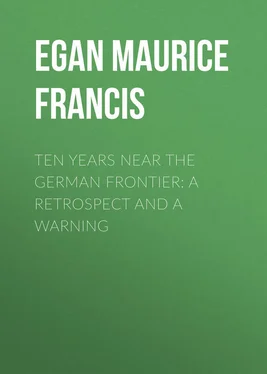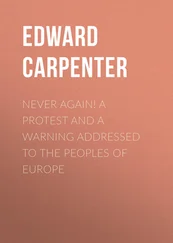Maurice Egan - Ten Years Near the German Frontier - A Retrospect and a Warning
Здесь есть возможность читать онлайн «Maurice Egan - Ten Years Near the German Frontier - A Retrospect and a Warning» — ознакомительный отрывок электронной книги совершенно бесплатно, а после прочтения отрывка купить полную версию. В некоторых случаях можно слушать аудио, скачать через торрент в формате fb2 и присутствует краткое содержание. Жанр: foreign_antique, foreign_prose, на английском языке. Описание произведения, (предисловие) а так же отзывы посетителей доступны на портале библиотеки ЛибКат.
- Название:Ten Years Near the German Frontier: A Retrospect and a Warning
- Автор:
- Жанр:
- Год:неизвестен
- ISBN:нет данных
- Рейтинг книги:5 / 5. Голосов: 1
-
Избранное:Добавить в избранное
- Отзывы:
-
Ваша оценка:
- 100
- 1
- 2
- 3
- 4
- 5
Ten Years Near the German Frontier: A Retrospect and a Warning: краткое содержание, описание и аннотация
Предлагаем к чтению аннотацию, описание, краткое содержание или предисловие (зависит от того, что написал сам автор книги «Ten Years Near the German Frontier: A Retrospect and a Warning»). Если вы не нашли необходимую информацию о книге — напишите в комментариях, мы постараемся отыскать её.
Ten Years Near the German Frontier: A Retrospect and a Warning — читать онлайн ознакомительный отрывок
Ниже представлен текст книги, разбитый по страницам. Система сохранения места последней прочитанной страницы, позволяет с удобством читать онлайн бесплатно книгу «Ten Years Near the German Frontier: A Retrospect and a Warning», без необходимости каждый раз заново искать на чём Вы остановились. Поставьте закладку, и сможете в любой момент перейти на страницу, на которой закончили чтение.
Интервал:
Закладка:
'Is the United States serious about the Monroe Doctrine – really?' he asked.
'It is an integral part of our policy of defence.'
'We, in Germany, do not take it seriously. I understand from my friends you have lived in Washington a long time. We are familiar with your relations with President Cleveland and of your attitude towards President McKinley. We know,' he said, 'that President McKinley offered you a secret mission to Rome. We know other things; therefore, we are inclined to take you more seriously than most of the political appointees who are here to-day and gone to-morrow. Your position in the affair of the Philippines is well known to us. It would be well for you to ask your ambassador at Berlin to introduce you to the Emperor; he was much pleased with your predecessor, Mr. O'Brien. There is, no doubt, some information you could give his Imperial Majesty. You have friends in Munich, too, and in Dresden there is the Count von Seebach whom you admire, I know.'
'I admire Count von Seebach, but I am paid not to talk,' I said; 'but about the secret mission to Rome in the Philippine matter – you knew of that?'
It was more than I knew, though President McKinley, through Senator Carter, had suggested, when the Friars' difficulty had been seething in the Philippines, a solution which had seemed to me out of the question. But how did this man know of it? I had not spoken of it to the Count von Seebach, or to anybody in Germany. No word of politics had ever escaped my lips to the Count von Seebach, who was His Excellency the Director of the Royal Opera at Dresden.
'Yes; we know all the secrets of the Philippine affair, even that Domingo Merry del Val came to Washington to confer with Mr. Taft. I want to know two facts, – facts, not guesses. Your ministers who come from provincial places, after a few months' instruction in Washington, cannot know much except local politics. They are like Pomeranian squires or Jutland farmers. We know that Henckel-Donnersmarck and you are on good terms, and we are prepared to treat you from a confidential point of view.'
This was interesting; it showed how closely even unimportant persons like myself were observed; it was flattering, too; for one grows tired of the foreign assumption that every American envoy has come abroad because, as De Tocqueville says in Democracy in America he has failed at home.
'Mr. Poultney Bigelow, whom you doubtless know, once said in conversation with the Kaiser, that his father would rather see him dead than a member of your diplomatic corps, and he was unusually well equipped for work of that kind. With few exceptions, as I have remarked, your service is pour rire . What can a man from one of your provincial towns know of anything but local politics and business?'
I laughed: 'But you are businesslike, too; I hear that, when the Kaiser speaks to Americans – at least they have told me so – it is generally on commercial subjects. He likes to know even how many vessels pass the locks every year at Sault Sainte Marie, and the amount of grain that can be stored in the Chicago elevators.'
'It is useful to us,' my acquaintance said. 'You would scarcely expect him to talk about things that do not exist in your country – music, art, literature, high diplomacy – '
My reply shall be buried in oblivion; it might sound too much like éloquence de l'escalier .
After an interval, not without words, I said:
'It is not necessary for a man to have lived in Washington or New York in order to have a grasp on American politics in relation to the foreign problem at the moment occupying the attention of the American people or the Department of State. Every country boy at home is a potential statesman and a politician. I recall the impression made on two visiting foreigners some years ago by the interest of our very young folk in politics. "Good heavens!" said the Marquis Moustier de Merinville, "these children of ten and twelve are monsters! They argue about Bryan and free silver! Such will make revolutions." "I cannot understand it," said Prince Adam Saphia. "Children ask one whether one is a Republican or Democrat."'
'That may be so,' he said. 'Your Presidents are not as a rule chosen from men who live in the great cities.'
'You forget that, while Paris is France, Berlin, Germany – '
'No, Berlin is Prussia,' he said, smiling; 'but London is England; Paris, France; and Vienna would be Austria if it were not for Budapest.'
'New York or Washington is not, as you seem to think, the United States.'
'That may be,' he said, 'nevertheless it is difficult for a European to understand. It may be,' he added thoughtfully, 'there are some things about your country we shall never come to understand thoroughly.'
'You will have to die first – like the man of your own country who, crossing a crowded street, was injured mortally and cried: "Now I shall know it all ." You will never understand us in this world.'
'That is blague ,' he said. 'We Germans know all countries. Besides, you know the German language.'
'Who told you that? It's nonsense!' I asked, aghast.
'The other day, I have heard that the Austrians were talking in German to the First Secretary of the German Legation at the Foreign Office, when you suddenly forgot yourself and asked a question in good German!' he said triumphantly.
This was true. Count Zichy, secretary of the Austrian-Hungarian Legation, had dropped from French into German. Now, I had read Heine and Goethe when I was young, and I had written the German script; but that was long ago. There were great arid spaces in my knowledge of the German language, but something that Count Zichy had said about an arbitration treaty had vaguely caught my attention, and I had blundered out, 'Was ist das, Herr Graf?' or something equally elegant and scholarly. This was really amusing. My friends had always accused me of turning all German conversation toward Wilhelm Meister and Der Erlkönig , since I could quote from both!
'You can finesse ,' continued the great nobleman. 'You are not usual. Your Government has sent you here for a special mission; it is well to pose as a poet and a man of letters, but you have been reported to our Government as having a mission secrète . You are allied with the Russians; we know that you are not rich.' This very charming person, who always laid himself at 'the feet of the ladies' and clicked his heels like castanets, did not apologise for discussing my private affairs without permission, and for insinuating that I was paid by the Russian Government.
'Do you mean – ?'
'Nothing,' he said hastily, 'nothing; but the Russians use money freely; they would not dare to approach you . Nevertheless, I warn you that their marked regard for you must have some motive, and yours for them may excite suspicions.'
'Surely my friend Henckel-Donnersmarck has not reported me to the Kaiser?'
'Our ministers are expected to report everything to the Kaiser, especially from Copenhagen; but Henckel-Donnersmarck does not report enough. He is either too haughty or too lazy. My master will send him to Weimar, if he is not more alert; but we have others!'
'I like him.'
'It is evident. Why?' asked the Count, with great interest.
'I sent him a case of Lemp's beer. He says it is better than anything of the kind made in Germany – polite but unpatriotic.'
'You jest,' said the Count. 'You have the reputation of being apparently never in earnest, but – '
'You shall have a case too,' I said, 'and then you can judge whether his truthfulness got the better of his politeness, or his politeness of his truthfulness.' He rose and bowed, he seated himself again.
'Remember, we shall always be interested in you,' he said; 'but there is one thing I should like to ask – are you interested in potash?'
Читать дальшеИнтервал:
Закладка:
Похожие книги на «Ten Years Near the German Frontier: A Retrospect and a Warning»
Представляем Вашему вниманию похожие книги на «Ten Years Near the German Frontier: A Retrospect and a Warning» списком для выбора. Мы отобрали схожую по названию и смыслу литературу в надежде предоставить читателям больше вариантов отыскать новые, интересные, ещё непрочитанные произведения.
Обсуждение, отзывы о книге «Ten Years Near the German Frontier: A Retrospect and a Warning» и просто собственные мнения читателей. Оставьте ваши комментарии, напишите, что Вы думаете о произведении, его смысле или главных героях. Укажите что конкретно понравилось, а что нет, и почему Вы так считаете.












